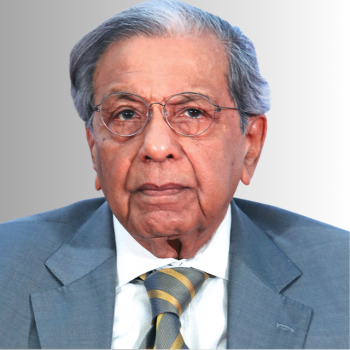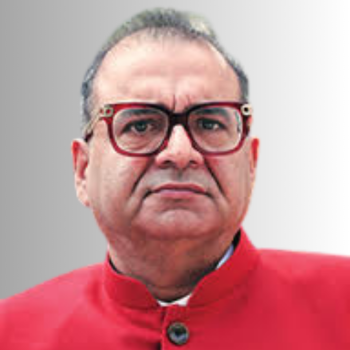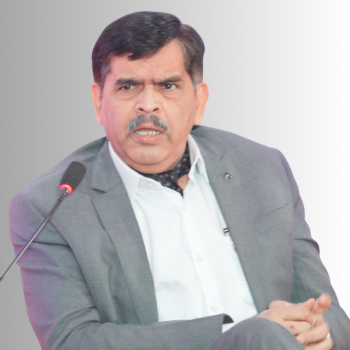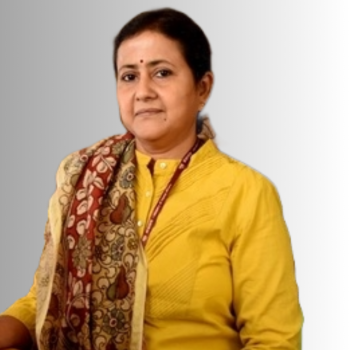
67th SKOCH Summit | Wednesday | 28 October 2020 | 0900-1800 hrs
Response to COVID
Expediting National Digital Health Mission
Learning from Best Practices
Governance Response to COVID
The primary role of SKOCH Summit is to act as a bridge between felt needs and policy making. Most conferences act like echo-chambers with all plurality of view being locked out. At SKOCH, we have specialised into negotiating with different view-points and bringing them to a common minimum agenda based on felt needs at the ground. This socio-economic dimension is critical for any development dialogue and we happen to be the oldest and perhaps only platform fulfilling this role. It is important to base decisions on learning from existing and past policies, interventions and their outcomes as received by the citizens. Equally important is prioritising and deciding between essentials and nice to haves. This then creates space for improvement, review or even re-design. Primary research, evaluation by citizens as well as experts and garnering global expertise then become hallmark of every Summit that returns actionable recommendations and feed them into the ongoing process of policy making, planning and development priorities.
The 67th SKOCH Summit has the following panels:
Panel 1: Response to COVID
SKOCH has been actively working in the area of policy for public health through field research, documenting best practices and bringing felt needs to the policy discourse. Given COVID and its implications, there is no bigger public policy challenge that we face. There are vast differences in the ways various countries are responding to the pandemic and within countries there are marked differences at the federal approaches and responses being given by the union and the states.
Given COVID and its multidimensional implications, a 360 degree response is required which focuses not only on contact tracing, testing, medical research and vaccinations, but also on expanding state capacity, economic health, health governance and policy, policing and last mile social interventions.
This panel seeks to explore what such a consolidated response should comprise and asks the following questions:
- What are the key challenges at the resource, institution and policy levels?
- How are last mile institutions operating and thriving in their response to COVID despite these challenges?
- What initiatives should be taken to strengthen state capacity and transform health governance for India’s response to COVID?
Panel 2: Expediting National Digital Health Mission
On the 15th of August 2020, from the ramparts of the Red Fort – Prime Minister Narendra Modi announced a gamechanger initiative for the lives and health of every Indian citizen in the form of a National Digital Health Mission (NDHM), which seeks to make healthcare data of all citizens available to healthcare workers. This national repository would go a long way in making healthcare accessible and affordable.
The mission envisages providing a unique Health ID to all citizens which will be linked to their Patient Health Records (PHR). This unique 14-digit ID, which will also contain a QR Code will make it easier for each citizen to have access to their historical health data be it diagnostic or lab reports, prescriptions, discharge and procedural summaries to be easily accessed in one digital location to be able to provide quick and easy medical service facilities to all citizens.
This will not only empower citizens but also allow hospitals, doctors and insurance companies to easily access patient health records and drastically reduce costs and processing times for delivering their services. With the Arogya Setu app, the database would make it possible for easy tracking and tracing of any infection.
India will be the first country to implement a transformational change of this magnitude and deliver interoperability of health systems with healthcare service providers, hospitals, patients and medical/health insurance providers – government or private.
The key questions this panel seeks to address are as follows:
- Can the National Digital Health Mission be expedited and leveraged in time for COVID-19 vaccine delivery?
- Can the Digital ID envisioned under the National Digital Health Mission be used for effective vaccine delivery and treatment monitoring?
- Can the digital health ecosystem be leveraged for optimised, seamless and successful implementation
- What are the challenges that such a database faces and how would the state best address these issues?
Panel 3: Learning from Best Practices
This panel examines the micro-level interventions undertaken on the ground by public administrations in response to COVID19. Given the vast size of the country, a singular response to the pandemic could not be expected, but outcomes can be. There are beacons of hope that have innovated with dynamism responding to the local challenges in varying degrees by looking at the felt-needs of the people. Needless to say, these felt-needs of the people would vary greatly from the Nilgiris to Katni. The efforts may have been dissimilar but the objective has been the same and so has been the impact.
Irrespective of the headlines, India is fortunate to have well performing projects and interventions dispersed across the country on effective response to COVID. While expert studies are quick to question, or praise state level performance based on a limited set of parameters – we believe that it is too soon to pass such macro level judgements.
This panel looks at some well performing projects and micro-level interventions that all stakeholders have found to be an appropriate response to the specific problem at hand. Eventually, the density of such interventions within a state will determine how well the state has responded.
- Despite all odds, how have some of the project level interventions performed well?
- Are there any innovations or best practices that can be taken note of and replicated?
- How to ensure that champion-led initiatives now become systemic?
Panel 4: Governance Response to COVID
In a post COVID world, government and governance will both be defined by their speed of response, dynamism and adaptability. The pandemic has completely altered the way citizens and governance institutions interact with each other.
Digital transformation has been a key component of this post-pandemic change. Be it policing, health or social justice, the government has delivered a digital response. This panel seeks to explore the intricacies of this governance response to COVID.
The key questions this panel seeks to ask are as follows:
- How has governance adapted to the use of digital technologies during the COVID pandemic?
- How has the interaction of government and changed during the pandemic?
- How have governance institutions evolved in India to deliver an effective last mile response to this global challenge?
Health Medical and Family Welfare Department, Government of Andhra Pradesh
Bihar Agricultural University, Sabour, Bihar
Directorate of Horticulture, Government of Bihar
Throne Venture Tech Llp, Chennai
Central TB Division, Ministry of Health and Family Welfare, Delhi
Delhi Jal Board, Government of NCT Delhi
Food Safety & Standards Authority of India, Delhi
VMMC and Safdarjung Hospital, Delhi
Delhi Urban Shelter Improvement Board, Delhi
Life Circle Health Services Pvt Ltd, Delhi
State Nodal Cell, Health & Family Welfare Department, Gujarat with MDIndia Health Insurance TPA Pvt Ltd, Gujarat
Institute of Kidney Diseases and Research Center & Institute of Transplantation Sciences, Ahmedabad, Gujarat
CGSM & RC Shraddha Hospital Borsad, Gujarat
Health Department, Haryana
Department of Health & Family welfare, Government of Himachal Pradesh
Dr YSP Govt. Medical College, Nahan, District; Sirmaur, Himachal Pradesh
Department Of Health & Family Welfare Services, Government of Karnataka
Aikenist Technologies Pvt. Ltd, Karnataka
AssisTech Foundation (ATF), Karnataka
Karnataka State Remote Sensing Applications Centre, Karnataka
National Health Mission – Arogyakeralam, Kerala
District Medical Office, Ernakulam, Kerala
Kudumbashree, Kerala
Department of Health Services, Kerala
Maharashtra Building and Other Construction Workers Welfare Board, Maharashtra
Impact Guru Technology Ventures Pvt Ltd, Maharashtra
VVP Healthcare Evolution Pvt Ltd, Maharashtra
Sthapatya Consultants (I) Pvt.Ltd, Maharashtra
Briota Technologies Pvt Ltd, Maharashtra
Regional Centre of ICAR-Central Tuber Crops Research Institute, Odisha
Post Tsunami Sustainable Livelihoods Programme, Tamil Nadu
Agricultural Engineering Department, Government of Tamil Nadu
Health Sensei India Pvt Ltd, Tamil Nadu
Apollo Micro Systems (AMS), Telangana
Aerobiosys Innovations Private Limited, Telangana
Public Works Department, Uttar Pradesh
National Health Mission, Uttarakhand
Akums Drugs & Pharmaceuticals Ltd, Uttarakhand
West Bengal Pollution Control Board, West Bengal
Department of Women and Child Development & Social Welfare, Government of West Bengal
Gorakhpur Industrial Development Authority (GIDA), Uttar Pradesh
Bharat Dynamics Limted, Andhra Pradesh
South Eastern Coalfields Limited, Chhattisgarh
Container Corporation of India Limited, Delhi
Bharat Heavy Electricals Limited, Delhi
Integrated system for transformer manufacturing, inspection, review & document preservation
Inhouse Development of Electrostatic Disinfectant Unit to fight against COVID-19 Pandemic
Cyber Security resilience during COVID-19 pandemic
Leveraging Work From Home for achieving Organisation Objectives
In house development of Non-contact Hand Sanitizing Systems and reusable plastic
National Seeds Corporation Limited, Delhi
Power Finance Corporation Limited, Delhi
REC Limited, Delhi
Oil & Natural Gas Corporation, Delhi
Madhya Gujarat Vij Company Limited, Gujarat
Uttar Gujarat Vij Company Limited, Gujarat
BEML Limited, Karnataka
Bharat Electronics Limited, Karnataka
Hindustan Aeronautics Limited, Karnataka
Bharat Petroleum Corporation Limited, Kerala
ITL Industries Limited, Madhya Pradesh
Madhya Pradesh Power Transmission Co. Ltd, Madhya Pradesh
Western Coalfields Limited, Maharashtra
Bharat Petroleum Corporation Ltd, Maharashtra
The Shipping Corporation of India Ltd, Maharashtra
Rajasthan State Mines And Minerals Limited, Rajasthan
Transmission Corporation Of Telangana Limited, Telangana
Tripura State Electricity Corporation Limited, Tripura
West Bengal State Beverage Corporation Limited, West Bengal
Chittoor District Police, Andhra Pradesh
Crime Investigation Department, Andhra Pradesh
Tirupati District Police, Andhra Pradesh
Vizianagaram District Police, Andhra Pradesh
Kadapa District Police, Andhra Pradesh
Vijayawada City Police, Andhra Pradesh
Crime Investigation Department, Andhra Pradesh
Kamrup (Rural) Police Department, Assam
Adimali Police Station, Kerala
Kochi City Police, Kerala
Kerala State Police, Kerala
Kolkata Police, West Bengal
Andhra Pradesh Police Department, Andhra Pardesh
Home Quarantine Mobile Application
Mobile Data Terminal Application
Disha Centralized Command Control Room
Emergency Response Vehicle Tracking System
AP Police Seva Mobile Application
COVID-19 Emergency Pass Application
e DSR, Andhra Pradesh Police Department
Remote Area Communication Enhancement
Disha Integrated Crime Scene Management

















 Dr Ashwani Mahajan, National Co-Convener, Swadeshi Jagaran Manch
Dr Ashwani Mahajan, National Co-Convener, Swadeshi Jagaran Manch